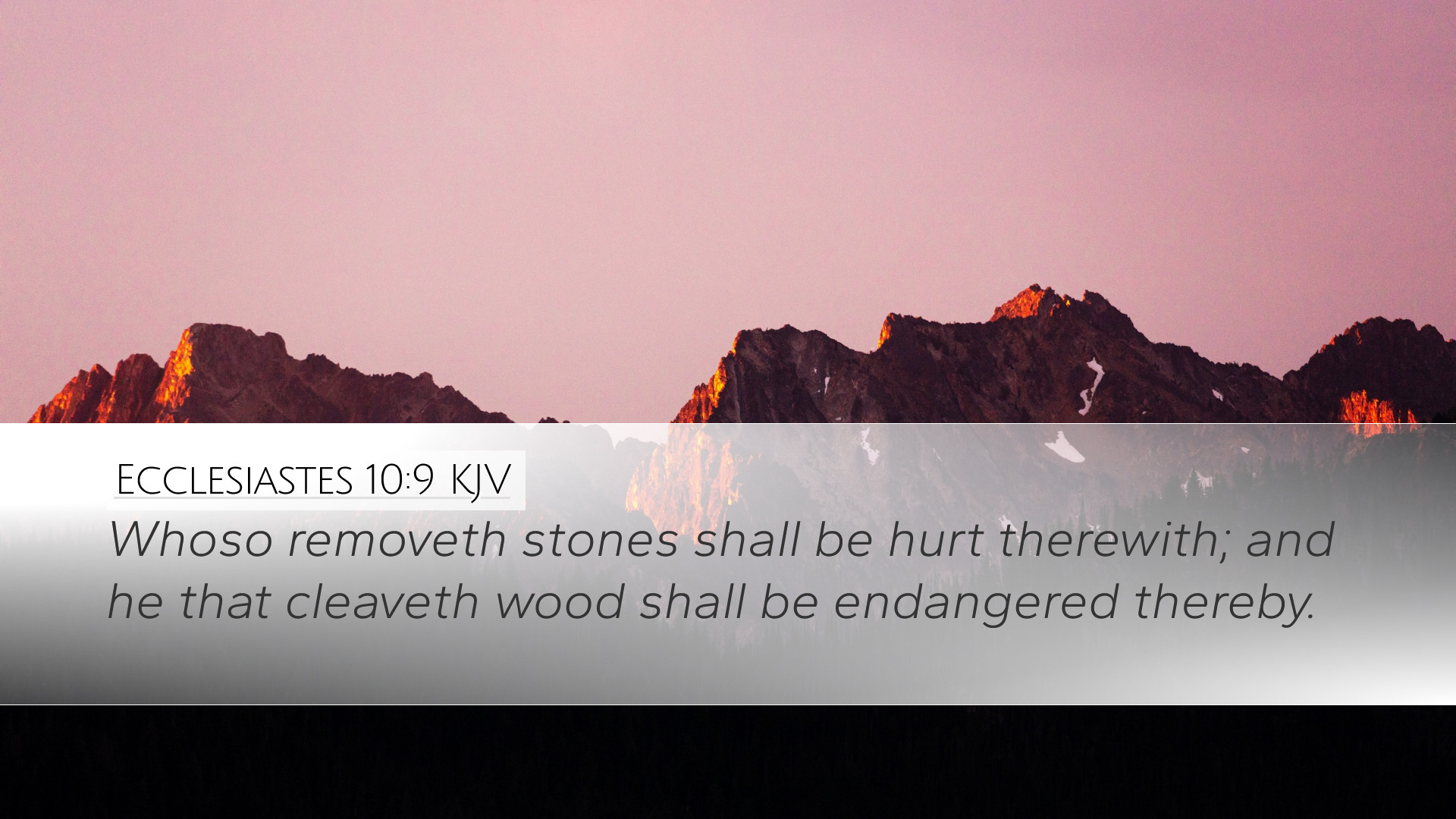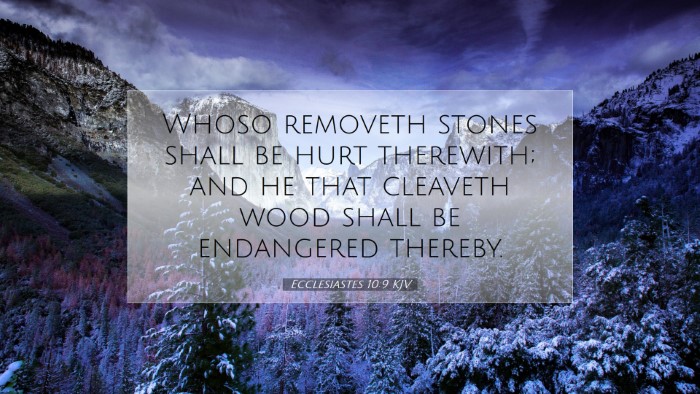Commentary on Ecclesiastes 10:9
Verse Text: "Whosoever removeth stones shall be hurt therewith; and he that cleaveth wood shall be endangered thereby." (Ecclesiastes 10:9 KJV)
Introduction
This verse from the book of Ecclesiastes encapsulates many profound themes central to wisdom literature. The Preacher uses everyday imagery to convey deeper ethical truths. The labor involved in removing stones and cleaving wood serves as a metaphor for undertaking various endeavors in life, particularly those fraught with risk and challenge.
Contextual Overview
The book of Ecclesiastes, traditionally attributed to King Solomon, frequently reflects on the meaning of life and the human condition. In this particular chapter, Ecclesiastes 10 focuses on wisdom in daily living and the dangers of foolishness. Chapter 10 contrasts wise and foolish actions, urging readers to navigate life's complexities with discernment.
Interpretation of the Verse
Scholars like Matthew Henry emphasize the practical implications of the verse. The act of removing stones suggests engaging in work that requires effort and bears potential hazards. Similarly, cleaving wood is an activity that, while necessary, also comes with risks. This serves as a reminder of the dangers inherent in various legitimate labors.
Labor and Its Risks
Henry articulates that, while labor is commendable, it is not without its hazards. Engaging in tasks that are essential for provision and utility can also lead to injury if not done wisely. There is an implied call for prudence; those who engage in work must be aware of its dangers and prepare accordingly.
The Need for Wisdom
Albert Barnes expands on this thought by suggesting that wisdom is critical for undertaking any task. The 'stone' is representative of obstacles or challenges that a wise person must navigate carefully. Attempting to remove these stones without due consideration can lead to harm. This idea underscores the necessity of approaching life's endeavors with caution and wisdom.
Wisdom in Action
Adam Clarke brings to light the practical applications of this wisdom. He notes that not all endeavors will lead to success; there is an ever-present danger associated with labor, particularly in efforts that seem straightforward. Clarke warns against impulsive actions that lack reflection and forethought. The wise person anticipates the dangers before engaging in strenuous tasks and prepares themselves accordingly.
Theological Implications
This verse opens up a conversation about human responsibility in the face of divine sovereignty. While God is ultimately in control, human beings are tasked with the stewardship of life’s affairs. The Preacher's assertion reminds us that we must engage life actively, but with an awareness of its risks.
The Balance of Faith and Works
This verse echoes throughout scripture, promoting a balance between faith and works. Faith is foundational, but works are necessary as expressions of that faith. Implicitly, the verse calls upon believers to act wisely in their endeavors, combining trust in God with diligent labor.
The Nature of Human Endeavor
Human endeavors are subject to the fallen nature of the world, which includes vulnerability to unforeseen challenges. This reality requires believers to continuously seek God’s guidance and to act wisely in their dealings, knowing that labor, while essential, also demands a careful approach.
Applications for Pastoral Ministry
This verse serves as a critical reminder for pastors and ministry leaders to impart the values of wisdom and prudence to their congregations. As leaders in the church, they should encourage congregants to engage their lives with caution, tempered by faith and collective wisdom.
Counseling in Decision Making
In guiding individuals making significant life decisions, pastors can use this verse to articulate the importance of forethought and careful planning. Offering biblical counsel that emphasizes wise actions can help followers navigate personal and communal challenges.
Beware of Foolish Actions
Moreover, this scripture can serve as a cautionary tale against rash decisions and thoughtless endeavors. Encouraging congregants to think carefully about their choices—be it in personal relationships, financial investments, or church ministry—can cultivate a community that values wisdom.
Conclusion
Ecclesiastes 10:9 encapsulates the dual nature of labor—the benefits and the potential harms. Emphasizing the necessity of wisdom in all endeavors, it reminds readers of the importance of preparation, forethought, and divine reliance amidst life's unavoidable risks. This commentary draws upon the insights of Matthew Henry, Albert Barnes, and Adam Clarke to illustrate the multifaceted nature of this verse and its profound implications for our daily lives as believers.


